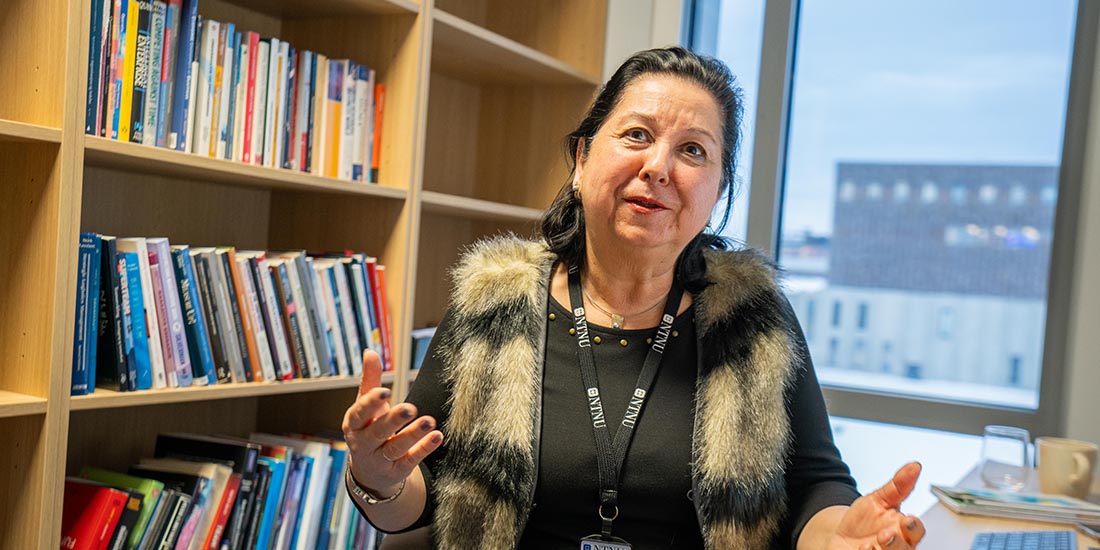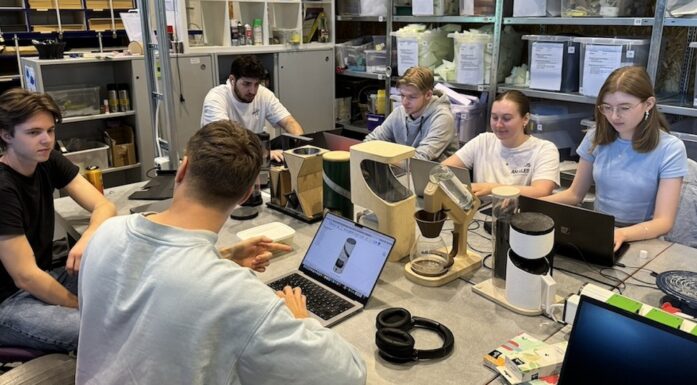Researcher warns against technostress
New technology aims to enable us to always do even more. A researcher has issued a warning about what this ‘efficiency hysteria’ is doing to us and our workplaces.
Solveig Beyza Narli Evenstad has become all too familiar with the dark side of the push for greater efficiency, not only through her research, but also in her own life.
“After more than 20 years of working to find new ways of improving efficiency, it gradually dawned on me that there are no limits on how quickly or how much people should work,” she says.
By then, Evenstad had herself reached a point where she felt burned out. It made her take a good look at herself:
“Is it the technology or the people who use it that I care most about?”
The answer she reached would trigger a change of career.
“There isn’t much that scares me more”
Evenstad is now an associate professor at NTNU in Gjøvik. Part of her work involves research on how technology impacts efficiency and wellbeing in businesses and organizations.
Despite her change of career, she has in no way lost her love of technology. However, her hard-won experiences have given her a more nuanced view of the use of technology in the workplace.
“There’s still not much that fascinates me as much as technology and the countless possibilities that it offers. But there isn’t much that scares me more either. The use of technology that we see in many places today is simply dehumanizing,” said Evenstad.
“Working life has already undergone extensive digitalization and automation, with ‘doing more with less’ as a guiding principle,” she explained.
“We are now also facing artificial intelligence, which will not only make us even more productive, but also bring about fundamental changes in the nature of our work,” she said.
- You might also like: Are you at risk of burnout?
Technostress and alienation
New technologies offer many benefits, yet they also present potential pitfalls. Given that the pace of development is now faster than ever before, it is also more important than ever that we are equipped to make wise decisions, Evenstad said.
“We cannot blindly give in to the never-ending drive to do more in less time. If we constantly enhance human beings by providing them with new technology just to make everything work a little bit faster, there is a danger that little by little we will give away our autonomy and be reduced to nothing more than a cog in a machine,” she said.
She believes that many people already feel alienated and stressed by the technological developments at work.
There’s still not much that fascinates me as much as technology and the countless possibilities that it offers. But there’s isn’t much that scares me more either.
“The fact that we have started talking about ‘technostress’ is a big red flag. People are quite simply struggling to keep up with developments and feel like they never quite manage to catch up,” Evenstad said.
Given that newly introduced technology also offers advanced surveillance capabilities, she believes that the alarm bells should really be ringing now.
- You might also like: A walk in the woods actually helps with anxiety and depression
Sneaking under the radar
In recent years, horror stories told by Amazon employees have raised eyebrows among many people.
Warehouse staff talk about having their ‘time off tasks’ monitored. In other words, every moment not spent scanning or packing is logged. If the total time exceeds a certain number of minutes, the employee will immediately receive an automatically generated warning. Receiving several such warnings can lead to dismissal, and former Amazon employees say they have even been fired via an app.
A New York Times survey found that eight of the top ten private companies in the USA use similar tools to monitor their employees.
“Technologies like this are often introduced on the pretext of boosting staff productivity or smoothing out uneven workloads,” explained Evenstad.
Furthermore, some employers argue that some of these technologies can improve safety and security. For example, some employers say that the technology will help prevent sensitive information from falling into the wrong hands.
Many people already feel alienated and stressed by the technological developments at work.
“It may well be that genuine efficiency considerations or concerns about trade secrets being leaked are involved. However, the fact that the technology also entails problematic opportunities as regards monitoring and surveillance is not always talked about as much,” she said.
As a result, monitoring technology has a tendency to sneak under the radar.
A foothold already established in Europe
It is not just in the USA that the use of monitoring and surveillance technology is raising concerns either. According to research by the Eurofound Foundation, similar tools are also being developed and used in Europe.
In particular, what is known as ‘bossware’ is being introduced in many places,” Evenstad said.
This portmanteau of ‘boss’ and ‘software’ is used to refer to computer programs that enable employers to monitor their employees digitally.
“These are specialist tools that can collect data about all digital work-related activity. Artificial intelligence then analyses the data and generates work profiles for employees, managers and teams,” she explained.
“Many applications that are already an important part of the working lives of many Norwegians have similar features,” she said.
“Tools like Microsoft Viva, through Microsoft 365 apps (Teams, OneDrive, Outlook, SharePoint), help to create a ubiquitous digital environment where data about the employees’ activities are collected, analysed and often commercially exploited,” she added.
This may seem relatively harmless compared with what is happening in the USA. However, Evenstad is convinced that we cannot afford to be naïve.
“Microsoft was actually ordered to remove a feature from Teams that gave managers a ‘productivity score’. The feature assigned employees who spent a lot of time on the internet a low score, while spending a lot of time on e-mails led to a high score,” she explained.
- You might also like: Half of the world’s population suffers from headaches
The Norwegian model could be under threat
The NTNU researcher believes that the EU’s recently adopted AI Act will be vital in regulating the development of this type of software in the future. Not only will such programs very probably continue to spread, but artificial intelligence could potentially also take monitoring to entirely new levels.
“Artificial intelligence is already well on the way to being able to read your mood and interpret your emotions just by looking at your face or listening to your voice,” she said.
She hardly dares think about what this feature could be used for were it to be used in a surveillance context.
The fact that technology also presents problematic opportunities for monitoring and surveillance is not always talked about as much.
“It could be anything from cracking down on attempts to establish or join a union, as Amazon is already attempting to do, to carrying out mood analyses, for use in assessing your suitability for a job,” she said.
The EU’s AI Act is therefore an important and absolutely necessary measure. At the same time, it is far too general for us to rely on alone, according to Evenstad.
“We are entirely dependent on having a counterpart locally in the workplace. Safety delegates and elected representatives must have up-to-date knowledge and awareness of developments, so that they can monitor them closely. They must also be much more involved in the discussion about which technology should be introduced in the workplace than is the case today,” she added.
Otherwise, she fears for the future of the Norwegian model, which is traditionally based on values such as participation, autonomy and trust.
“According to a 2023 survey by the Fafo Research Foundation, digital monitoring is only being introduced to a modest extent in Norway. Nevertheless, more research is needed to obtain a clearer picture of its extent. The question is how long it will take for the US approach, with its widespread monitoring, to become common in certain industries here, too,” she said.
“We must not allow ourselves to be pressured”
Evenstad is also concerned that this development requires wise leaders.
“Managers have a responsibility to implement technology responsibly. Too much focus on checks and monitoring and a lack of trust in employees undermines employee motivation and harms performance and wellbeing,” she said.
Evenstad believes we should be careful about using technology just because others do.
“We must not allow ourselves to be pressured into keeping up with the rest of the pack. It is vital that we control the technology before it controls us,” she concluded.





